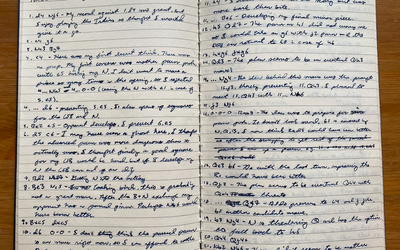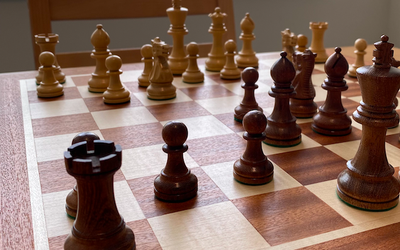
Learning From an Opponent's Blunder
Why winning positions are so terrifyingApologies for the delayed post. Sometimes life puts chess blogging in the back seat. Despite a lull in blogging I have managed to play a classical game each week. This post includes analysis of one of those games, which included an unfortunate blunder from my opponent which effectively ended the game. The blunder made me wonder what you can learn from an opponent's blunder. My thoughts on that topic follow the analysis.
Here is the game in question.
A few thoughts before a discussion of the blunder:
- I am playing the French Defense a lot and often end up in situations similar to those seen on turn 5: White's dark-squared Bishop is pining my Knight. My response is almost always to put my own dark-squared Bishop on e7. My justification for doing so is that it develops a piece and breaks the pin. In my notes for this game I wrote, "Bg5 is a familiar theme. Be7 seems better than h6 as it develops the Bishop." After I turned on the engine I discovered that it does prefer h6 to Be7. The evaluation for Be7 is -0.6. For h6 it is -0.7. I'm not beating myself up about missing a move that is clearly miles and away better, but I am frustrated that I discovering why h6 is marginally better difficult. What resource should I consult? What are the directions to the French Defense Temple where I can offer a sacrifice in exchange for knowledge? Does any of this matter anyway? I should look into answering these questions.
- On move 21 I played Rac8, which is fine but not exactly a move I was excited about. The move did not hurt, but I could have pushed the a pawn. Such a move perhaps have made the game more exciting and provided me an opportunity to learn more about pawn pushes. I often find that I do not take the opportunity to push pawns when I should. Neglecting to do so in such a dominant position is a little frustrating.
- I felt as if I had potentially blundered on move 30, allowing 31. f5. The engine reveals that after this move I am still in a great position, but it did not feel like that during the game. I spent more than two minutes staring at the board worried that I had managed to squander an advantage. In the end, I decided to threaten the opponent's Queen. For whatever reason, I could not see Qd4+. It seems so obvious now. It is a little frightening that I did not even consider it. There is no commentary in my notes attached to move 31. This is all rather baffling, especially considering I had almost 10 minutes on the clock. I have at least reminded myself to always take a deep breath and rule out forcing moves before moving on to alternatives.
The turning point of the game was when my opponent hung their Knight on move 14. From that point forward the plan was relatively simple: stabilize, be open to trades, and don't hang a back rank mate. Yet winning positions have a habit of stressing me out more than they should. Chess history is full of players failing to convert winning positions, and at my level falling for a fork or pin is never out of the question. The Lichess analysis shows that after the blunder I began to play more slowly. You might think, "Good! You should take your time and calmly convert." But more of my time in the middle and endgame was spent in baseless panics rather than calm conversion and calculation.
That a clearly winning position is such as source of anxiety is not great news for my improvement. In drawn or near-equal positions I often find myself in a calm, almost meditative state. Somehow the fear that I could mess up a clear win distracts me from what the board is telling me. The board never lies, but it is sometimes hard to hear what it is telling you.


